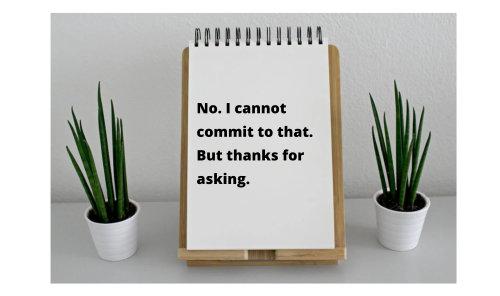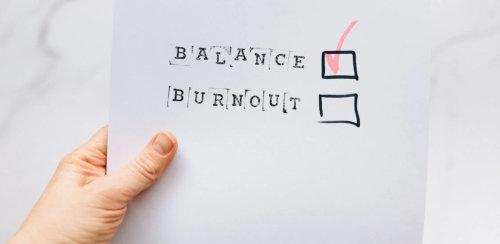I was talking with a friend yesterday who told me she was "guilted into" hosting Thanksgiving dinner again this year. She was clearly upset that she said yes, but
didn't know how to say no.
Saying no is a skill that many find challenging, often associating it with offense or indifference. However, learning to say no is essential for maintaining
personal boundaries and well-being. Here's how you can confidently say no and still feel good about yourself:
1. Saying No is a Choice, Not a Requirement: Understand that saying no is a valid choice, just like saying yes. Both responses are acceptable, and you have the power to
make the decision that aligns with your needs and priorities.
2. Integrity and Saying No: Recognize that being a person of integrity doesn't mean saying yes to everything. Saying no ensures you stay true to your commitments and prioritize your existing
responsibilities.
3. Keep Your Priorities in Mind: Prioritize your life by keeping your goals and commitments in focus. Saying no to requests that don't align with your priorities is a perfectly acceptable way to manage your time and energy.
4. Empower Yourself: Embrace empowerment by increasing your capacity to make choices that align with your goals. Saying no is a powerful expression of self-determination and control over your life.
5. Free Yourself from Guilt: Recognize that saying no is about voicing your opinion, standing up for your rights, and taking control of your life. Remind yourself daily that saying no is a healthy act of self-assertion.
6. Strength in Saying No: Understand that saying no is a sign of strength, indicating self-awareness of your strengths, abilities, and limitations. If a flat-out no feels challenging, consider saying "Let me take a day to consider it" or "Let me pray on it and I'll get back to you" instead.
7. Evaluate Your Feelings: Reflect on how you feel when you say yes willingly versus when you say yes reluctantly. Positive feelings come from genuine willingness, while negative emotions such as frustration and stress accompany reluctant agreement.
8. Assertiveness, Not Confrontation: Recognize that being assertive in saying no is not a negative trait. It demonstrates self-respect and self-esteem, indicating you are not responsible for everything and everyone.
9. No Conflicts with Values:
Never feel guilty about saying no to something that conflicts with your values or morals. Protecting your principles is a legitimate reason to decline.
10. Provide Explanations When Necessary: When saying no, it's okay to offer an explanation. Whether due to a lack of
skills, time, or personal need for time, being honest and upfront is commendable. But don't feel you have to. A simple, "thank you for thinking of me, but I can't help this time around" is perfectly acceptable.
11. Minimize Stress with Three Steps: Smoothly transition from a
request by acknowledging it, conveying your circumstances, and minimizing the rejection. Soften the no with phrases like "Maybe next time if my schedule frees up by then" or "Have you considered asking Gina or Larry?"
12. Saying No Opens Doors: Understand that saying no can free up
time for new experiences and opportunities. It allows you to explore different hobbies and interests beyond your current commitments.
13. Yes is Not Always the Best Answer: Realize that saying yes when overcommitted can lead to negative consequences for yourself and others.
Balancing your commitments prevents exhaustion and promotes overall well-being.
14. Graceful Decline for Good Causes: Acknowledge the value of good causes but gracefully decline when necessary. Compliment their efforts and express your inability to commit at the moment, ensuring
you maintain a positive connection.
Getting back to my friend, I asked her what she felt she could do to make hosting this year more enjoyable. After thinking about it, she said, "I
supposed I could ask my guests to each bring a portion of the meal. Do you think that would be OK to do."
My response, "Absolutely! Let your guests know that you'll be making the turkey
(or whatever main dish you choose), but that you're delegating the side dishes to everyone else. Make a list of parts of the meal and be sure each guest knows what is assigned to him/her. That person can then choose to make or buy a store-bought version of that portion of the meal."
And then I told her to begin thinking about next year's Thanksgiving right away. If she doesn't specifically want to host, it's important to be strong and say so. Maybe suggest rotating the celebration with another family member, eating out, or even opting out of hosting althogether (at some point, you may want to simply "pass on the baton" to another family member...especially if
you've been the main person hosting for years.)
I also reminded my friend that it's still pretty early in the month, which means there is still time to opt out out and not host this
year, as long as it's not inconveniencing anyone who may have purchased airline tickets or took extra time off from work.
She can tell whoever she needs to that "after considering again, I
really don't feel I can make this work. Let's discuss other options."
Remember, mastering the art of saying no is a valuable skill that contributes to a healthier and more balanced life. Prioritize your well-being while maintaining respect and consideration for others.












